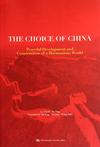中国的抉择
2012-3
中国人民大学出版社
李景治,蒲俜 著,徐莹,古华,王金鹤 译
212
It is manifested that China's diplomacy is
lacing unprecedented transformation with both opportunities and
challenges ahead. What is China's strategic choice when it is
confronted with the new international situation and power
distribution'? This book analyzes the possibility and inevitability
fbr China to take the path of peaceful development and construct a
harmo-nious world. After ali. nobody wants China to rise in a
western way to an empire. With the continuous rising of China's
economy and the recovery of China's cultural confidence, it's
inevitable for China to make the right choice of peaceful
development.
Protessor Li Jingzhi is a doctoral supervisor of the
School of International Studies at Renmin University of China, with
contemporary world economics and politics as his research focus. He
successively held the positions of Head of the International
Politics Departlllent, Dean of the School of International Studies,
the University Council Member, member of Degree Evalua-tion
Committee and University Academic Com-mittee at RUC.
chapter one the conception of china's peaceful development and a
harmonious world
i. the proposal of peaceful development and a harmonious
world
ii. main connotation of the concept of peaceful development and a
harmonious world
iii. characteristics of china's path of peaceful development
chapter two china's peaceful development and the international
order
i. opportunities the international order offers to china's path of
peaceful development
ii. restraints the present international order imposes on china's
peaceful development
iii. china's peaceful development contributes to the establishment
of a just and legitimate international order
chapter three china's peaceful development and economic
giobalization
i. economic globalization creates a favorable international
environment for china's peaceful development
ii. international economic frictions and problems emerge in the
course of china's peaceful development
iil. resources and environment exerts influence on china's
peaceful development
iv. china's means to overcome the resources and environment
bottlenecks
chapter four china's peaceful development and diplomacy
i. strengthening strategic mutual trust with countries
concerned
ii. seeking the appropriate settlement of problems rooted in
history
iii. strengthening china's diplomatic soft power
chapter five sticking to peaceful development and promoting the
building of a harmonious world
i. china's peaceful rise:an inexorable trend of historical
evolution
ii. a harmonious world is the rational expectation of china's
peaceful development
iii. constructing a harmonious world benefited from china's
peaceful development
iv. international strategy of china's peaceful
development
status and prevailing advantages and influence over other states. After WWII, as the leader of western freedom and democracy, the US began to seek for world hegemony through its tit-for-tat competition with the Soviet Union. After the Cold War, the US was universally recognized as the sole superpower.And in terms of the distribution of power, the US hegemony had very obvious characteristics. As Henry Kissinger noted that at the dawn of the new millennium, the United States was enjoying a preeminence unrivaled by even the greatest empires of the past. From weaponry to entrepreneurship, from science to technology, from higher education.to popular culture, America exercised an unparalleled ascendancy around the globe. Especially in military arena, the US was far ahead of other countries. This predominant position offers the US the golden opportunity to establish unipolar hegemony. Some scholar thus asserted that the 20th Century was the American Century and so will be the 21st century. And in harmony with this, "absolute hegemony" and"Pax Americana" had been vigorously agitated within American administrations.Especially after the 9.11 Incident, George W. Bush made major adjustments to the US global strategy. With its strategic'goal to consolidate US unipolar hegemony and its strategic focus on strangling the rise of rivals who seek to challenge the hegemonic position of the US, the adjusted global strategy further revealed the US neo-conservativism characterized by favoring war and unilateralism.Towards the rapid rise of China, a comparatively objective and practical attitude is adopted by the US government and its mainstream society who have gradually accepted the rise of China after careful observation. Generally speaking, they tend to be quite optimistic about the rise of China, holding that there's no sure evidence indicating that Chinese leaders are actively seeking to counter the power of the US, undermine the unipolar system dominated by the US and then replace. ……
